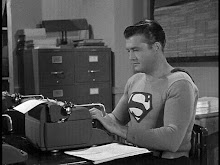We're going to start the rehearsal process on Saturday for "Cock-A-Doodle-Doo," but that doesn't mean that we've been taking a break on the project. Oh no. I spent time emailing back and forth the the writer/producer and the stage manager, looking at proposed cuts to the script and trying to get the most out of our production. But as we look at specific issues of cutting lines and rearranging passages, we came across a much more fundamental debate about the issue of adaptation. So I'd like to also take this opportunity to reflect a little bit about what I think makes for a "good" adaptation. Almost ten years ago, there were some fine examples of the art of adaptation, in terms of turning books into movies. And the examples were all the most shining because both projects took very different approaches to the material, and both achieved different results. I refer, of course, to "Lord of the Rings" and "Harry Potter and the Sorcerer's Stone."
When setting out to adapt "The Fellowship of the Ring," Peter Jackson decided to tackle the book that many people had long considered "un-filmable."

When the time came to work on the actual scripts for the films, Jackson and his fellow screenwriters made some excellent decisions adapting the books for the screen. They knew that some sections would not translate well onto film, and those sections were either changed or cut. (Hence the loss of Tom Bombadil, and the compression of time early in Hobbiton.) He also changed scenes around to give the romantic pair more screen time together, even though they didn't have those scenes in the book. Was his script letter-perfect to the Tolkien novel? No, even if he did take full speeches and pieces of the text. But, more importantly, did the film capture the spirit and flavor of Tolkien's story? Yes, even if some scenes were changed around. Peter Jackson didn't lock his script to the novel, insisting on shooting the source material exactly as it was first created. He adapted (note the word!) the story as it appeared in a novel, and he presented the story as it would be best perceived in a film. Going from one medium to another requires that changes be made.
On the other side of this equation is Chris Columbus' first Harry Potter

film, "The Sorcerer's Stone." I'll confess that it's been a while since I read the book and saw this movie, but I remember that very little of the book was changed for the film. Almost everything was how it was on the page, with the exception of a few scenes that were moved around to give the movie a little more time on the Hogwarts Express. But since the script doesn't translate, or "adapt," the story for the new medium, the movie itself seems slow and poorly paced. And it's not a matter of the story or the characters, because I am a fan of what Rowling created in this series of books. But it's not just about putting the page on the screen, but rather adjusting and adapting so the new experience is something different than the old one. If the movie is just the same as the book, why did you make it into a movie?
As you can see, I fall solidly in the first category, thinking that the best adaptations are the ones that can make a successful leap into the new medium of entertainment. I wouldn't have long descriptive passages in a movie, and long scenes that play without any dialogue can be beautifully written in book-form. But film and theatre are mediums of the visual, while books are a medium of the imagination. I'm always pushing for the cuts to be made in descriptive passages, or sections in which the narrator is describing what he is doing. It's a stronger theatrical choice to simply see the action, instead of hearing about it as well. Our stage manager wants to preserve as much of Melville's actual words as possible, leaving the narrator's voice intact as much as possible. Our writer/producer has declared that he is more conservative when it comes to cutting things, but that he's open to trimming here and there to tell the story in the best way.
I will keep updating the blog as we encounter specific instances of these different, yet compatible, opinions. I love this kind of stuff!
 This is a working radio, AM/FM, about a foot high, with a knob for volume and a knob for tuning, and I've already been using my ipod transmitter to broadcast some episodes of old time radio through this radio. It really feels like stepping back in time to hear the voice of Orson Welles coming out of that contraption. I am such a fan of the old time radio, it was a real treat for me to find something like this in a thrift store. Not only is it a great prop for my Radio Hound Production projects, but it also seems to be the perfect accessory for a custom action figure... of The Shadow.
This is a working radio, AM/FM, about a foot high, with a knob for volume and a knob for tuning, and I've already been using my ipod transmitter to broadcast some episodes of old time radio through this radio. It really feels like stepping back in time to hear the voice of Orson Welles coming out of that contraption. I am such a fan of the old time radio, it was a real treat for me to find something like this in a thrift store. Not only is it a great prop for my Radio Hound Production projects, but it also seems to be the perfect accessory for a custom action figure... of The Shadow.







